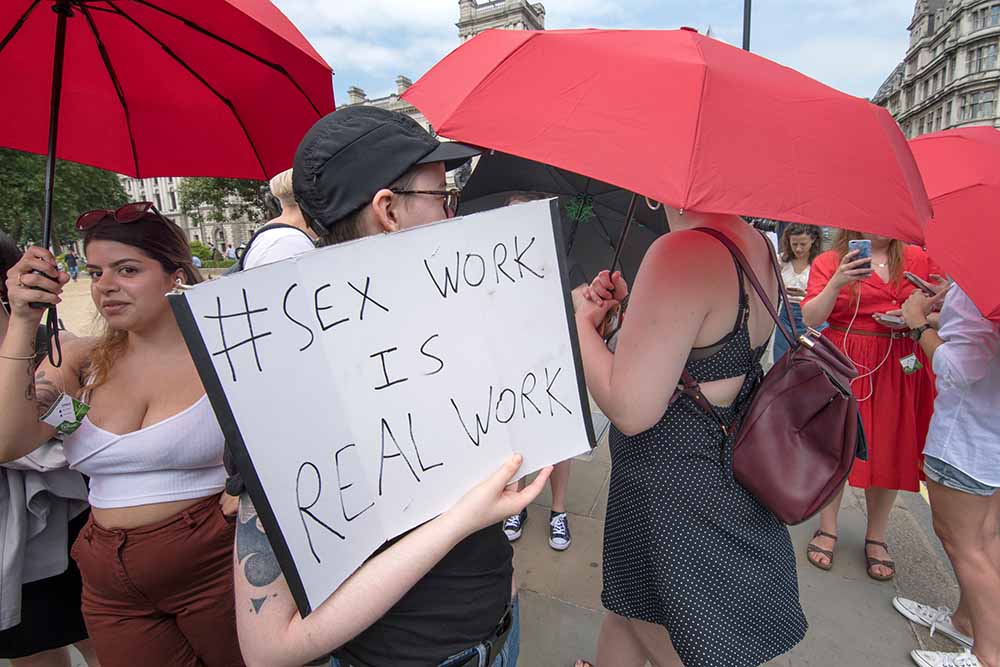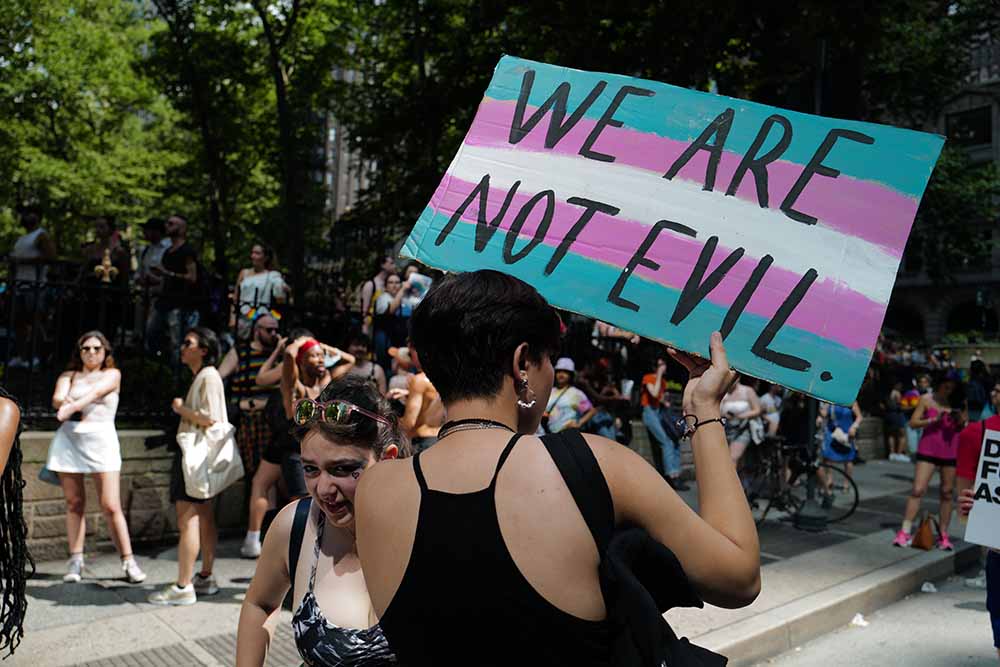Ask anyone, even Google, and they’ll acknowledge that sex work or prostitution is the oldest profession in the world. The only difference—and the only one that matters—that this profession has from all others is that sex workers make up one of the most exploited and vulnerable groups in the whole world. Whether they’re men, women, transgenders or children, sex workers live in highly ghettoised areas, have limited or no access to education, healthcare and other job prospects, and are often not even considered full citizens of the nation they belong to.
This means that in every city, town and region of the world, there’s a group of people whose very basic human rights are constantly violated. This group largely, and traditionally, consists of women—which makes women sex workers doubly disadvantaged because of their gender as well as profession. The violations of this group are so severe that those of us living safer, more privileged lives have no idea about the things these women face every day. This is why understanding the position and condition of sex workers, especially in the Indian context, is critical. Here’s what you should know.
The Oldest Profession, But No Protection?
Throughout our history, sex workers have faced the brunt of marginalisation and criminalisation. During the 18th and 19th centuries in India and the world, sex workers were considered to be disease carriers and “red light” areas were considered to be hotspots for major communicable diseases. This is proved especially by the existence of Venereal Diseases Acts of India in the 1860s and 1870s, and the existence of “lock hospitals” where sex workers were restrained as diseased bodies. During this century, it was women like Florence Nightingale, Josephine Butler and Harriet Martineau who opposed these repressive legislations throughout the British Empire. However, these legislations were expanded into the Contagious Diseases Act and enforced well into the 19th century too.
You might expect that this deplorable lack of protections faced by sex workers as a category of the population would be evaluated with a new perspective after India achieved independence. Nothing could be further from reality. A 2013 study published in the SSRN Electronic Journal, titled Human Rights of Sex Workers in India: The Way Forward, explains that despite the fact that India has signed on to the United Nations’ Universal Declaration of Human Rights in 1948—and created many monumental legislations tied to the Indian Constitution and Indian Penal Code, like the Code of Criminal Procedure, Minimum Wages Act, NCW Act, Protection of Human Rights Act, and anti-trafficking laws—there is still a lack of a single piece of legislation that guarantees the basic human rights of sex workers directly.
In fact, the study also shows that this gap in legislation remains despite the establishment of the National Human Rights Commission (NHRC), National Commission for the Protection of Child Rights and the National Commission for Women (NCW). Despite decades of welfare and emancipation efforts, sex work is still criminalised and sex workers in India are still fighting for their very basic access to rights and amenities. In December 2021, the Supreme Court attempted at remedying this by asking the Centre and Union Territories to start issuing government identity cards—like voter, Aadhaar and ration cards—to sex workers so that they can access dry ration and aspire to access their other rights. “The fundamental rights are guaranteed to every citizen of the country irrespective of his/her vocation. There is a bounden duty on the government to provide basic amenities to the citizens of the country. The central government, state governments and other authorities are directed to commence the process of issuance of ration cards, voter ID cards and Aadhaar cards immediately,” the Supreme Court bench ordered.

Perspectives On Sex Workers’ Rights
Despite this and other attempts, the very basic truth is that we need to understand the plight of sex workers better to be able to aid them in accessing their rights. To do this, we have to first understand the various perspectives that exist regarding how to best give this section of the population their rights. According to a 2008 study for the Office of the United Nations High Commission for Human Rights, titled Rights and Issues of People Involved in Prostitution and Sex Work in India, there are two broad perspectives on sex workers’ rights:
1. The perspective that assumes that “all people engaged in sex work are coerced, bribed, blackmailed or forced into the trade.” This perspective holds that nobody ever “chooses” to do sex work for a living, and therefore, any money earned from this trade is equal to sexual exploitation. According to this perspective, the only way to give sex workers their rights is by freeing them from this exploitative trade. The moment they are no longer embroiled in the trade, they’ll automatically be able to access their rights and opportunities.
2. The perspective that assumes that sex work is a legitimate business and anybody engaged in it should get the same rights as other businesspersons and business owners. This perspective argues that the lack of rights and sexual abuse involved in sex trade is a result of stigmatisation and marginalisation. So, the moment sex work is decriminalised and treated as a business, all those engaged in this work will be able to organise themselves into unions or cooperatives or councils that can together ensure better access to business/financial rights, human rights, occupational health rights and safety regulations.
Violations Faced By Indian Sex Workers
While these perspectives on how to get sex workers their rights often come in conflict with each other, those slipping through the cracks are the actual sex workers, most of whom are women and children. The above-mentioned study for the UN as well as another from 2016, titled Violations Faced By Sex Workers in India, both highlight the various violations sex workers face every day. Here’s a closer look.
Legal violations: As mentioned before, Indian laws have failed to protect sex workers from violations, and this is the primary violation that leads to all others. The main law dealing with sex work in India is the Immoral Trafficking Prevention Act (ITPA), 1986, which not only hopes to prevent sex trafficking but also the public manifestations of sex work, like brothel operation and solicitation. However, this law also allows the eviction of sex workers from their places of residence in “public interest”, which often translates into a major problem for people who don’t have anywhere else to go. The ITPA is, in fact, more often used by the authorities to persecute sex workers instead of protecting them.
Raid, rescue, restore: Another feature of the ITPA allows enforcement officials and welfare organisations to raid the premises of sex workers, “rescue” the sex workers (especially minors), and “restore” them to their families. This entire process does not require the consent of the sex worker who is “rescued and restored”, and often, the girls or women who have been “rescued” actually feel like they are being incarcerated or uprooted from the life they know. Additionally, given the stigma associated with sex work, most of them do not get accepted back into their families or communities.
Stigma and marginalisation: This is the major societal and cultural violation that sex workers face. The fact is that sex work exists because there has always been a demand for it as an act that stays in the shadows or fringes of society. Sex work exists because there are clients who always want access to it, even if it is illegal, illicit and shamed constantly. And yet, sex workers face the brunt of this stigma not only personally, but also witness the next generation—their children—be constantly marginalised and violated to the extent that they are also forced into the same line of work to survive.
Lack of safety: Sex workers are one of the most vulnerable groups of people when it comes to being at the receiving end of violence. What’s more, they’re unlikely to get any protection from the police, who are often the perpetrators of the violence sex workers experience. Because sex work is considered to be morally corrupt, sex workers are considered guilty of any crime, which makes them even less likely to get any safety. However, in areas where women sex workers have formed collectives, like in Mumbai’s Kamathipura, the violence faced by sex workers is considerably less.
Lack of education: Many studies have shown that women sex workers have considerably lower levels of education compared to other people from the same areas. The deplorable part is that this lack of education access is not limited to women sex workers, but also extends to their children. These children face harassment, lack of admissions to schools, ostracisation and other issues that lead to a vicious circle of illiteracy as well as lack of opportunities.
Low access to healthcare: Stigma, marginalisation, illiteracy, ignorance and fear of the medical establishment (stemming from the long history of repression during when the Venereal and Contagious Diseases Acts were enforced, and due to the targeting they faced from the 1990s onwards due to the HIV/AIDS pandemic) make it very difficult for sex workers to access healthcare. Female sex workers are additionally vulnerable to sexually transmitted diseases (STDs) and other reproductive health issues because they are often forced to have sex without protection. During the COVID-19 pandemic, the access to healthcare for sex workers has been further limited, and since valid government identity cards are hard to come by for them, they have also been left behind in the vaccination drives.
Lack of right to privacy, free speech and consent: Because of the nature of sex work, most people consider sex workers as people who don’t necessarily have a right to privacy. Consent is another issue where sex workers are assumed to have no say. Free speech is also considered to be a right denied to sex workers because their work is perceived as so immoral and corrupt that their words aren’t taken seriously at all. It’s only with more awareness and elimination of stigma that these rights can be guaranteed.

How To Help Sex Workers Get Justice
Given the wide range of violations faced by sex workers, especially women and children, it’s necessary that everyone join the fight to help this disadvantaged population get social justice. Here are some ways you can help:
• Get educated about the violations sex workers face and spread the word about them as well.
• Donate to renowned charities and NGOs that work to get legal, educational and other support to sex workers.
• Volunteer to work in areas where sex workers live. Your work for them could be in the form of cleanliness drives, healthcare drives, education workshops, vocational training programmes, etc.
• Advocate better legislation, policies and governmental assistance for sex workers in your city, town, region, state or nation.